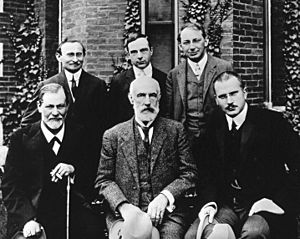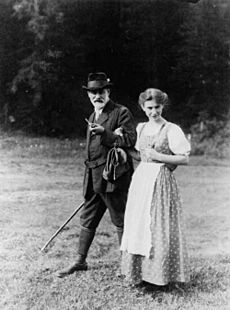Psychoanalysis facts for kids

Psychoanalysis is a way of understanding how our minds work. It's also a type of talk therapy. It helps people explore their thoughts and feelings. This approach was started by an Austrian doctor named Sigmund Freud. He learned a lot from other doctors like Josef Breuer.
Over time, psychoanalysis grew and changed. Freud's students and friends, like Alfred Adler and Carl Jung, developed their own ideas. Later, Anna Freud (Sigmund's daughter) and Melanie Klein used these ideas. They helped children who were having a tough time.
Here are some main ideas in psychoanalysis:
- What happens when you are very young can shape who you become.
- Our actions and thoughts are often guided by hidden feelings. These are called unconscious drives.
- Sometimes, our minds try to keep these hidden feelings from us. This is done through defense mechanisms.
- When hidden feelings clash with what we know, it can cause problems. These problems might include feeling very worried or sad.
- To feel better, we need to understand these hidden feelings. A therapist can help bring them into our awareness.
What is the Unconscious Mind?
Have you ever wondered why you feel a certain way? Or why you do something without knowing why? Psychoanalysis suggests that some feelings and actions come from our unconscious mind. This is a part of our mind we are not aware of. It holds many thoughts, memories, and desires.
How Does Psychoanalysis Work?
There are many different ways to practice psychoanalysis. It can also be used to study how children grow and develop.
One common method is called Freudian psychoanalysis. In this therapy, the patient talks freely about anything that comes to mind. This includes their thoughts, daydreams, and dreams. The therapist listens carefully to these stories. They try to find hidden conflicts that might be causing problems.
The therapist then helps the patient understand these hidden issues. This process is called gaining insight. It helps the patient see why they feel or act in certain ways. The therapist also helps them understand their defenses and wishes.
Is Psychoanalysis Still Used?
Some people have criticized psychoanalysis. They say it is not always based on scientific proof. However, it is still an important part of psychiatry today. Many therapists use its ideas to help people. In Spanish: Psicoanálisis para niños
In Spanish: Psicoanálisis para niños
 | Georgia Louise Harris Brown |
 | Julian Abele |
 | Norma Merrick Sklarek |
 | William Sidney Pittman |


